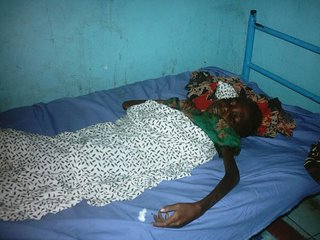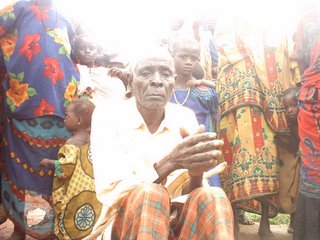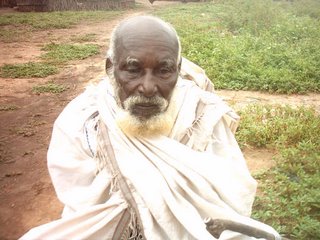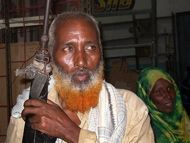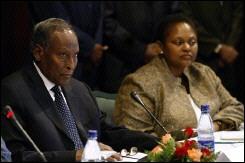The West are so desperatly grasping straws. They so want us to go back to war with each other. After all They have been behind the Artifical Civil War, and they want us to be like they made into Afghanistan forever a broken Nation. Insha Allah The Jewmericans and the British will fail Miserable! Fansurnaa Calal Qowmal Kaafiriin. Ilaahey baan idin baryee Balaayo Iyo Baas cirka la idinkaga soo rid America iyo United Kingdom. Oo Mashquul ku noqda dhibtiina Insha Allah .
For Somali they don't want broken Nation but also They want to break it into Half. ARE WE IN THE SECOND SCRAMBLE FOR AFRICA?
New Somali Government Faces Old Problem: Clans - New York Times
--------------------------------------------------------------------------------
January 22, 2007
New Somali Government Faces Old Problem: Clans
By JEFFREY GETTLEMAN
MOGADISHU, Somalia, Jan. 18 — Fifteen men and one woman sat on the floor of a sunlit room. It was hot. Many people were sweating. The elders of the Ayr clan had called a political meeting, and very quickly it was clear that their attitudes toward the nation’s newly empowered transitional government were unanimous — and bitter.
“The government is weak,” said Mohammed Abdi, an Ayr elder. “We can’t support it.”
Somalia, which has been an archetype of Africa’s ills for so long, has waited 16 years for this government. The United Nations has invested millions of dollars into propping it up. American officials are so intent on it succeeding that, in the interests of regional stability and counterterrorism, American forces have ventured onto Somali soil for the first time in more than a decade to hunt down the last of the Islamist leaders who held a firm grip on much of the country until just a few weeks ago.
But whether Somalia pulls itself together now or explodes into bloodshed again depends not on American troops, foreign peacekeepers, investment or aid. It depends on clans. “Clannism,” said Ali Mahdi Mohammed, an influential clan leader and once a contender for president, “is our national cancer.”
Video
It was clan animosities that tore down Somalia’s last government in 1991, clan militias that humiliated American troops in 1993, bringing a troubled aid mission to a hasty end, and clan warfare that has consumed countless lives and reduced Mogadishu, Somalia’s once-beautiful capital by the sea, into a pile of bullet-pocked bricks.
The government, which took the capital for the first time last month, is trying to address the clan problem head-on. It is using a mathematical formula based on rough estimates of the population (the last census was in 1975) to allocate parliamentary seats and ministerial posts on a clan basis, and plans to govern like that until the next elections, which are proposed for 2009.
But that approach is hardly original — and it does not have an encouraging history. It is the 14th attempt since 1991 to form a clan-based government; all the others have disappeared into a vortex of suspicion and violence.
The Green Line in Mogadishu, a blasted-out boulevard with blackened buildings on each side, is a monument to fratricide. It is the dividing line between two clans, the Haber Gedir and the Abgal, which are actually part of the same family.
Somalia’s main clans are divided into a dizzying number of subclans, sub-subclans and even sub-sub-subclans, and the term clan is loosely used for large family networks, like the Hawiye, and smaller ones, like the Ayr.
There is no definitive clan chart, with different clans disputing how they are interrelated, and Somalis argue over whether they have physical differences. But all clans are based on ancient genealogies. You cannot join a clan. You are born into one.
The Islamists, who seized power six months ago, had their own solution for this. They tried to submerge clan identities under the blanket of Islam, the one thing, besides language, that all Somalis share. They delivered more stability to Mogadishu in their short reign than the city had seen for a decade and a half.
But then they made an enormous mistake. In December, the Islamists tried to seize all of south-central Somalia, including Baidoa, the seat of the transitional government. Their attacks provoked a crushing response from neighboring Ethiopia, which commands one of the most powerful militaries in Africa and viewed the Islamists as a regional threat. Within a week, the Ethiopian forces, with approval from American officials, annihilated the Islamist army.
Now many Somalis wonder what would have happened to the Islamist ideology if the Ethiopians had never stormed in. “Islam was probably the best answer for us,” said Hassan Gedi Roble, a chief of the Dir clan. “A government of clans is only going to create clan competition.” The Islamists have gone underground, vowing to wage a guerrilla war.
And already the resistance in the capital is beginning to work along clan lines, with attacks against government troops concentrated in neighborhoods that were Islamist strongholds. Government soldiers are so frightened of driving through Tawfik, dominated by the Ayr, that they change out of their uniforms into street clothes before they enter. In other areas not far away, like Sinai, inhabited by many Abgal, shopkeepers pump their fists in the air and cheer when they see the government troops.
Clans have been the bedrock of Somali identity since the first bands of nomads fought over water holes.
“Out there, you needed to belong to someone,” said Yusuf Mohammed Ali, a shipping magnate and respected figure among the Suleiman clan.
The same is true today on Mogadishu’s chaotic streets. In a place that has teetered so long with no government, no police forces, few institutions and great uncertainty, clans function as a safety net, a social network — most people marry within their clan — a justice system and, most importantly, as protection.
The factionalism makes government a tricky affair. Somalia’s infamous warlords, like Muhammad Qanyare Afrah, are essentially clan leaders with their own clan armies.
Everybody in Mogadishu calls Mr. Qanyare a warlord, but he prefers “M.P.”
“We are members of Parliament,” he said, referring to a group of fellow militia leaders who were given positions in the government in an attempt to bring peace. “We are not street boys.”
Mr. Qanyare, who is from the Mursade clan, laid out the long history of conflict between the Haber Gedir (which includes the Ayr) and the Darod, the clan of the transitional president, Abdullahi Yusuf Ahmed.
Relations with the Ayr seem especially combustible: it is one of the largest clans in Mogadishu; many of the Islamist leaders were Ayr; and government officials have accused Ayr elders of backing the insurgency. Ayr elders say they have been cut out of the new administration.
American officials are urging the government to reconcile with all clans, and they are becoming increasingly alarmed about the authoritarian streak of the government, which has already declared martial law and briefly shut down radio stations.
Senator Russell D. Feingold, Democrat of Wisconsin and chairman of the Senate’s subcommittee on Africa, said at a conference in Washington this week that President Yusuf’s government was “already running the risk of missing a critical window to establish itself as a credible, transparent and representative government.”
The transitional government says security begins with disarmament, but so far disarmament has been mostly a farce. Mr. Qanyare and a few other militia leaders turned in some rusty guns this month.
But military grade firepower is still everywhere. Somalia was a cold-war dumping ground for arms, and then it exploded into every-clan-for-itself anarchy. That combination created such a gun glut that high-powered assault rifles are openly sold for $15 at a Mogadishu market called Sky Shooters (a place where shoppers test the goods by unleashing a stream of lead into the sky).
Many of Mogadishu’s residents, even those who resented the Islamists’ draconian decrees — no Western music, no cigarettes, no high-heeled shoes — said they felt safer a few months ago. That annoys Abdirizak Adam Hassan, the president’s chief of staff.
“This government is constrained by rules,” he said. “Unlike the Islamists, we can’t just go around lashing people.”
One obvious problem is the transitional government’s reliance on Ethiopian muscle. Ethiopian troops may have been willing to vanquish the Islamist army, but they are not willing to work as policemen.
The Ethiopian military is now threatening to leave altogether in a matter of weeks, apparently trying to pressure the United Nations and the African Union to quickly assemble a peacekeeping force to fill the vacuum. Only a small portion of the necessary troops have been committed, and it is not clear how the Somalis will receive them.
The best hope is that Mogadishu’s residents are so exhausted by war that they will not turn on the foreign peacekeepers the way they did in 1993 when they attacked American and United Nations soldiers who had come to help feed them.
Mr. Mahdi, the former presidential contender, said the government had about three months to pull things together. “After that,” he said, “Mogadishu will be ungovernable.”
Already, more than a dozen people have been killed in insurgent strikes. On Thursday, thousands of flyers mysteriously appeared across the city warning people to stay away from government soldiers.
Abdi Fatah, a former Islamist fighter who clipped his beard and swapped his robes for polo shirts and slacks, said, “The Ayr guys are meeting every night.”
The Ayr elders denied they were fueling the insurgency.
But when asked if the government had as much grass-roots support as the Islamists, their meeting room suddenly grew quiet.
“That was a joke, right?” one man asked. And then the room burst into derisive laughter.
Home
World U.S. N.Y. / Region Business Technology Science Health Sports Opinion Arts Style Travel Jobs Real Estate Automobiles Back to Top
Copyright 2007 The New York Times Company
Privacy Policy Search Corrections RSS First Look Help Contact Us Work for Us Site Map
 ALARAB ONLINE | Display Page
Libya hosts African leaders gathering
Libyan leader Muammar Gaddafi chaired a meeting of African presidents and other top officials on Thursday to prepare for an African Union summit, officials said.
"The next AU summit is very important. The leaders met today to coordinate and narrow their positions and standpoints so that they go to the summit united and speaking in one voice," Libyan Foreign Minister Mohammed Abdel-Rahman Shalgam told reporters.
Somali President Abdullahi Yusuf Ahmed was among the 11 heads of state and eight government representatives attending the meeting of the Sahel and Sahara African grouping, most of whose members are instrumental players in the AU which holds its next summit in Ethiopia in July.
"The meeting in Sirte focused on ways to strengthen the AU Commission further and the possibility of setting up an AU government supervising defence, foreign affairs, foreign trade and telecommunications ministries," Shalgam added.
Libya has been pushing for the AU to become a federation on the United States model.
Asked whether the meeting took any decision about sending troops to Somalia, Shalgam said: "No decision has been taken. Libya may not send troops there but it will lend support."
Nigeria said on Wednesday it would contribute up to 1,000 soldiers.
Uganda and Malawi have also offered troops, while South Africa and Mozambique said they may take part.
Somali government troops backed by the Ethiopian military defeated Islamist forces in the Horn of Africa country after a two-week war that begin in late December.
Ethiopian troops have begun leaving the country but attacks have continued in Somalia's capital, Mogadishu, and the government lacks a national powerbase and truly popular support.
"There is a determination and a good intention among African states to send troops to Somalia," Somali Foreign Minister Ismail Hurre Buba said. He said Yusuf would have further talks with Leader Gaddafi about support from Libya before returning home.
ALARAB ONLINE | Display Page
Libya hosts African leaders gathering
Libyan leader Muammar Gaddafi chaired a meeting of African presidents and other top officials on Thursday to prepare for an African Union summit, officials said.
"The next AU summit is very important. The leaders met today to coordinate and narrow their positions and standpoints so that they go to the summit united and speaking in one voice," Libyan Foreign Minister Mohammed Abdel-Rahman Shalgam told reporters.
Somali President Abdullahi Yusuf Ahmed was among the 11 heads of state and eight government representatives attending the meeting of the Sahel and Sahara African grouping, most of whose members are instrumental players in the AU which holds its next summit in Ethiopia in July.
"The meeting in Sirte focused on ways to strengthen the AU Commission further and the possibility of setting up an AU government supervising defence, foreign affairs, foreign trade and telecommunications ministries," Shalgam added.
Libya has been pushing for the AU to become a federation on the United States model.
Asked whether the meeting took any decision about sending troops to Somalia, Shalgam said: "No decision has been taken. Libya may not send troops there but it will lend support."
Nigeria said on Wednesday it would contribute up to 1,000 soldiers.
Uganda and Malawi have also offered troops, while South Africa and Mozambique said they may take part.
Somali government troops backed by the Ethiopian military defeated Islamist forces in the Horn of Africa country after a two-week war that begin in late December.
Ethiopian troops have begun leaving the country but attacks have continued in Somalia's capital, Mogadishu, and the government lacks a national powerbase and truly popular support.
"There is a determination and a good intention among African states to send troops to Somalia," Somali Foreign Minister Ismail Hurre Buba said. He said Yusuf would have further talks with Leader Gaddafi about support from Libya before returning home.

